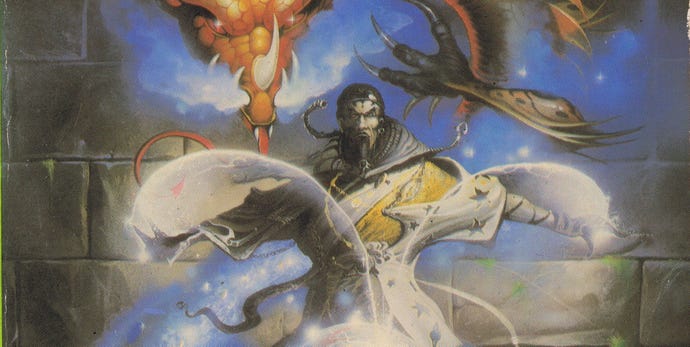You Are The Hero: A History of Fighting Fantasy
Eurogamer's Damien McFerran chats to Steve Jackson and Ian Livingstone about creating a page-turning legend.
This article first appeared on USgamer, a partner publication of VG247. Some content, such as this article, has been migrated to VG247 for posterity after USgamer's closure - but it has not been edited or further vetted by the VG247 team.
Choice is a powerful thing. It's what differentiates video games from other mediums of entertainment.
Outside of watching alternative endings on DVD, the outcome of a movie cannot be influenced by the viewer; likewise, a great album's track listing can be randomised, but the songs remain the same. In games, the player is able to directly impact the world with their own actions. This liberating and intoxicating sense of involvement was also central to the appeal of Steve Jackson and Ian Livingstone's Fighting Fantasy line of interactive gamebooks, first established in 1982 -- ironically, a time when the video game industry appeared to be tiptoeing dangerously close to oblivion.
The Fighting Fantasy gamebooks followed a non-linear format; you started at the beginning and ended at the end, but in between you would flit backwards and forwards through the pages, picking choices at the conclusion of each passage which could either take you to glory (turn to 246) or spell certain doom (your adventure ends here). Confrontation was also inevitable, and was decided by throwing dice to resolve combat with the many monsters, aliens and other hostile creatures you faced throughout the 59 original books which were published between 1982 and 1995. Around 15 million copies were sold during that period of time -- a figure that creators Jackson and Livingstone could never have possibly expected when they pitched the concept to publisher Penguin in the early 80s.
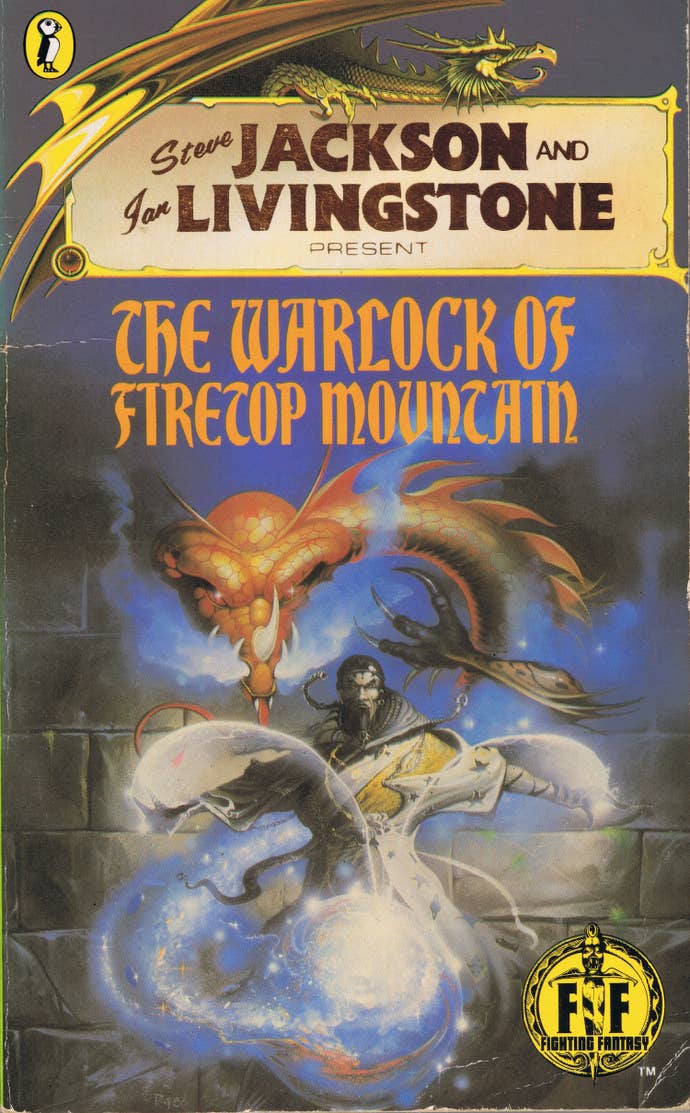
"Ian and I started Games Workshop in 1975," explains Jackson. "At the time it was an amateur operation, run from a flat in Shepherd's Bush [in London, UK]. We published a games fanzine by the name of 'Owl & Weasel', sold obscure games by mail order and manufactured classic wooden games like Backgammon and Go -- hence the name 'Games Workshop'. But then we discovered Dungeons & Dragons and very quickly everything switched over to role-playing games. We promoted the new hobby and obtained exclusive European rights to D&D and many other RPGs. We published White Dwarf magazine, established a shop and ran the Games Day convention. It was at one of these conventions in 1980 that we met Geraldine Cooke, an editor at Penguin Books. We managed to persuade her to consider publishing a book based on the role-playing hobby."
With a foot in the door, Jackson and Livingstone set to work on their proposed book, but it quickly became apparent that their pitch to Cooke could be improved. "Originally, this book was supposed to be a 'how-to-do-it' manual," continues Jackson. "But when it came to describing how to play RPGs, we came up with the idea of describing a game in action and ultimately decided it would be best done by letting the reader make choices. The more we thought about it, the more we really liked that idea. In fact, it was much more interesting than writing the RPG manual! So we abandoned the manual idea and put together what was to become the first gamebook." Their prospective publisher was rather taken aback by the change of format. "Geraldine didn't know what to make of it at all!" laughs Jackson. "She was expecting a guide to the hobby, but what we proposed was something completely different. She 'considered' the idea for several months before eventually giving us the green light."
Jackson and Livingstone divided writing duties between themselves for the book -- at this point called 'The Magic Quest' and eventually published under the more striking title of The Warlock of Firetop Mountain -- but this process created problems almost instantly. "You might notice that The Warlock of Firetop Mountain was co-written, but subsequent titles were written by us individually," Jackson says. "That was because it was a nightmare dividing the Firetop Mountain adventure between us. We had both created different combat systems for our parts of the adventure. Ian's had a 'Strength' factor and mine had 'Stamina'. Both were equally as good, but we had to decide on one of them. At one point we even decided to play a game of pool for it!
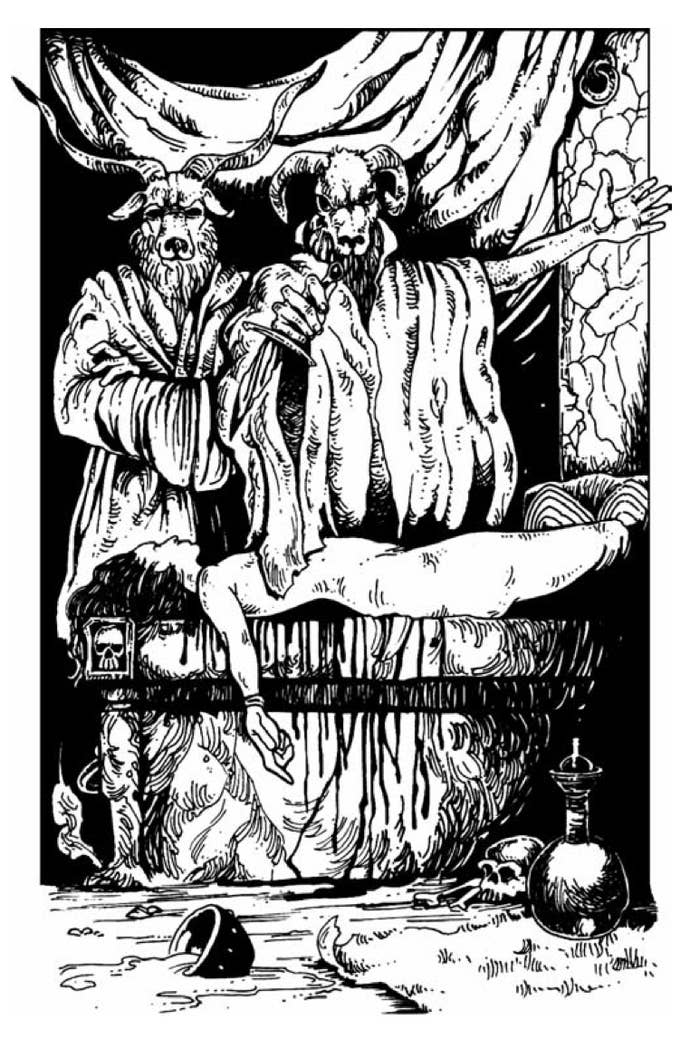
"Another problem was that we both had different writing styles. When we handed in the first draft of the manuscript, our editor said, 'It's a great idea, but when you get to the river, halfway through the adventure, the writing style changes completely. We can't publish it like this.' In the end I volunteered to go through the whole thing and make the writing styles more consistent. And while I was doing this, I opted for Skill, Stamina and Luck to become the combat system. From then on we wrote individually, so we could stick to our own styles -- but the combat system remained the same."
Writing a half-decent book is harder than you might assume -- just ask any aspiring author still striving for their first big success -- but writing one with a non-sequential story and multiple pathways is a whole other level of demanding. "Inter-meshing all the references was a complex task," explains Jackson. "There was no margin for error, or else you'd maybe get stuck with nowhere to go, like a computer crash. Personally I always started by writing the background and the start of an adventure, and then switch to writing the end. The last bit to be written was always the middle, so I could 'tune' the whole thing to 400 references."
Penguin's Geraldine Cooke may have opened the door for the pair, but she wouldn't get the ultimate credit from launching the series. "Geraldine was an adult editor at Penguin," explains Jackson. "But in the end they decided that Warlock should be published by Puffin -- the children's books arm. This was because they had a Children's Book Club which ran through schools and sales were likely to be higher. I always felt a bit sorry for Geraldine; she had discovered us but now had nothing to show." Jackson promised Cooke at the time that he would endeavour to create an adult range of similar books, which would eventually become the 'Sorcery!' series, released in a year later in '83.
Of course, such a promise would have counted for little if the first Fighting Fantasy novel was a flop, but thankfully that wasn't the case. The Warlock of Firetop Mountain was a runaway success, with demand far outreaching print supply. The incredible events of this period are still hazy to Jackson even today. "At the time it was all a bit of a blur. Warlock was reprinted many times over the first few months. The publisher wanted us to write more -- and quickly! 'How about another adventure in...a month's time?' The Citadel of Doom -- the second book -- took about five weeks, after which time I was exhausted. But inspired by the publisher's encouragement and the phenomenal sales figures, there was no time to rest! A typical day was being in to the Games Workshop office at 8:30am, working through the day until 7pm, driving home, catching a bite to eat, getting the typewriter out and typing until maybe 1am. Weekends were all for typing. We had zero social life; it was amazing we managed to keep our girlfriends. And still they wanted more books! So eventually we came up with a solution: bring in outside authors."
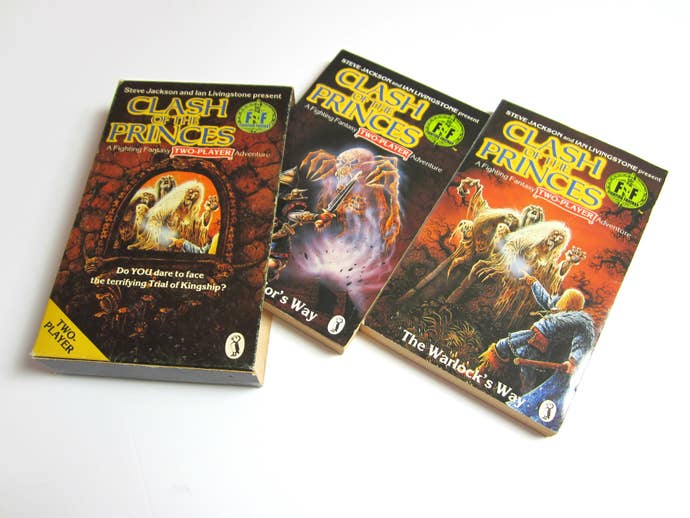
Getting additional help was the only way Jackson and Livingstone could realistically keep the series going, and maintaining momentum was vital in what was becoming a rapidly competitive marketplace. "After the first six to seven books, all the other publishing houses started coming out with their own versions of Fighting Fantasy," Jackson remembers. "We couldn't stop this so the solution proposed by Puffin was to have a new Fighting Fantasy book every month. So readers going into their bookshops would always have a new Fighting Fantasy book and would hopefully prefer that to one of our competitor's books. As Ian and I couldn't write a book a month, we opened Fighting Fantasy up to new authors. The 'Jackson & Livingstone Presents' series came into being. The first new author was... Steve Jackson!"
Even to this day, many Fighting Fantasy readers aren't aware that not one but two Steve Jacksons worked on the franchise -- the second being the Texas-based founder of Steve Jackson Games. Hiring a namesake wasn't a concerted effort to hide the exhaustion of the core team -- this fortuitous arrangement came about thanks to Games Workshop. "It all started when Steve Jackson came to the Games Workshop office to talk about distributing his games in Europe," says the English Steve Jackson. "We finished our business and told him about how well Fighting Fantasy was doing but how we needed to sign up more authors. He volunteered himself there and then, and spent the rest of his trip in our boardroom with a typewriter, writing Scorpion Swamp. He finished it off on his return to the US."
While Jackson and Livingstone were comfortable with having other writers on board, they insisted on maintaining ultimate creative control over the series. The original novels largely took place in the fictional kingdom of Allansia, lending the books a feeling of consistency and depth. However, the need for flexibility required the frontiers of this fantasy world to be enlarged somewhat. "When the 'Presents' series started we were a little worried about keeping track of this 'consistent universe' aspect," explains Jackson. "So we expanded the Fighting Fantasy world from just Allansia to the world of Titan, which comprised three continents: Allansia (where the Jackson and Livingstone books were based), The Old World (where Sorcery! and The Tasks of Tantalon were based) and Khul, where the 'Presents' series of adventures were located."
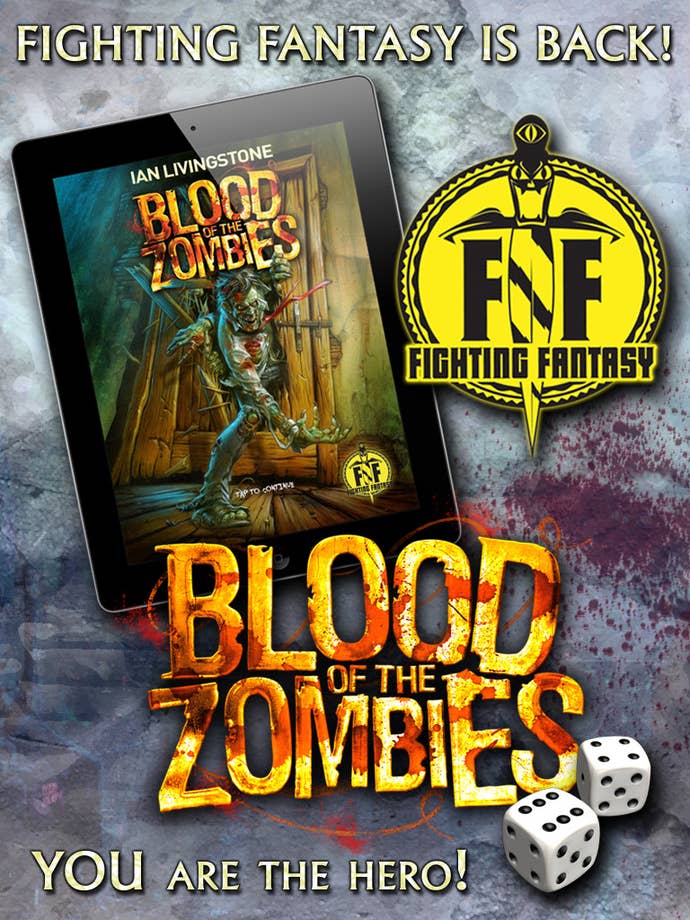
Getting more people involved also allowed the franchise to avoid the one pitfall which could have prematurely ended its success: a lack of fresh ideas. "We didn't want to write 'yet another' dungeon-based adventure; just churning out noble quest after noble quest was going to have the fans turning to other gamebook series," says Jackson. "That's where I think the 'Presents' series came into its own. There was a constant supply of quality adventures, which left Ian and I with the luxury of being able to pick and choose -- not needing to churn them out to keep the series going." Possibly the most ambitious gamebook was 1986's Clash of the Princes by Andrew Chapman and Martin Allen, which was a two book, two-player adventure that could be read along with a friend, both playing a different character. The pair of books were intended to be tackled simultaneously, with each player's experience synchronised with that of the other.
The stories crafted by the new authors were just as compelling and captivating as the early entries, but for many Fighting Fantasy fans it's the amazing covers and stunning illustrations which provide that nostalgic hook after all these years. Jackson and Livingstone's connection with Games Workshop -- and its White Dwarf magazine -- allowed them to mine a rich vein of artistic talent which included the likes of Ian Millar, John Blanche, Iain McCaig and Russ Nicholson, amongst others. "We were really lucky to have contacts with most of the UK's top fantasy artists, mainly through White Dwarf, which was by that point monthly and had a constant appetite for covers and fillers," remembers Jackson.
Given the often dark nature of some of the books, it's hardly surprising that the original print run wasn't entirely without incident. "There were a couple of adventures that had Puffin -- who were after all a children's book publisher -- feeling nervous," Jackson explains. "In House of Hell, there is a typical black magic ritual scene where a naked girl is being sacrificed on the altar. Tim Sell drew her covered with a sheet, but with a small amount of what might be described as 'nipple' visible. That one had to be re-touched before Puffin would let it go through. And I remember a 'game over' incident in Talisman of Death which describes the reader looking down to see himself impaled on a bloody spear, with his own guts and entrails spewing onto the floor. And of course there was always the clashes with religious groups like the Evangelical Alliance, who thought children shouldn't be reading about black magic, demons or the undead..."
These groups should have perhaps been more concerned with the fact that Fighting Fantasy was creating a generation of dishonest youngsters. So enthralling and well-written were the novels that many fans -- myself included -- blatantly cheated in order to keep the narrative flowing. Fingers would be used as impromptu bookmarks to ensure that wrong-turns could quickly be backtracked, and combat situations were never resolved but always won regardless of the strength of the foe. Does Jackson feel short-changed that after all the effort that went into creating these finely-tuned gamebooks, a certain percentage of readers shirked the challenge and cheated?
"I think the answer is 100 per cent of people cheated!" laughs Jackson. "That's what everyone tells us. Do we mind? No. But to those who cheated death and granted themselves victory in every encounter with a creature: would you have preferred the combat without the Skill and Stamina stats? Perhaps you were just given a choice of whether to 'Come on strong' or 'Hold back and let him make the first move'? No need to roll dice and count down Stamina points? This is an argument Ian and I have had. He says that since no one uses the combat system legitimately, there is no point in having it -- all the stats might put people off. My take on it is that coming across a Red Wyvern which is Skill 12, Stamina 24 gives you that small sense of heightened fear -- even though in the end you'll just ignore the battle and turn to the page where you've defeated the creature. Having the stats in offers the same sort of appeal as, say, Top Trumps."
Fighting Fantasy was one of the many properties to be impacted by the rise of interactive entertainment in the early '90s. Jonathan Green's Curse of the Mummy -- which was published in 1995 -- would be the final original entry until the release of Bloodbones in 2006. Despite the hiatus, the impact and influence of the series continues to impress Jackson. "I am always amazed at the fact that, in spite of the PC and console revolution which has seen drastic reductions in board game sales, Fighting Fantasy soldiers on. Apart from three years during the transition from Puffin to current publisher Wizard, Fighting Fantasy is still around after 30 years -- and in France they've never been out of print." Since the purchase by Wizard Books -- the children's imprint of UK publisher Icon -- several new installments have been produced, including the recent Blood of the Zombies, which is penned by none other than Livingstone himself.
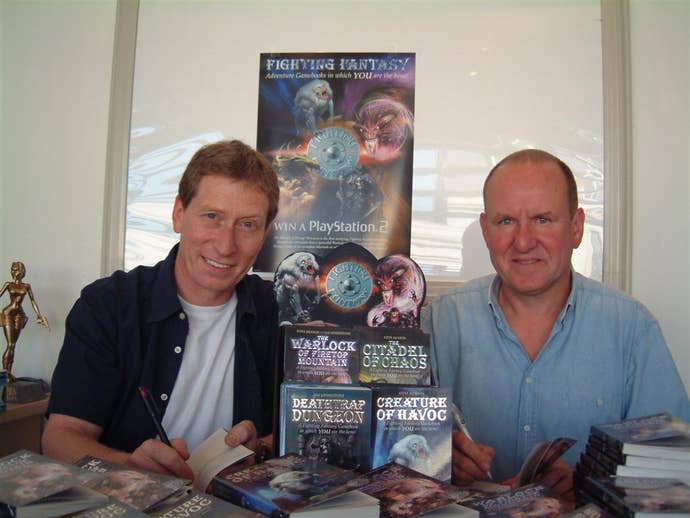
"I'd forgotten just how much fun it is writing a Fighting Fantasy gamebook," says Livingstone. "Luring readers to their doom in false hope, knowing that gruesome death awaits them makes me smile when I'm writing a gamebook. When I got down to writing Blood of the Zombies, I naturally thought about setting it in Allansia. Except for Freeway Fighter, all my books were medieval fantasy. However, I was well aware of video gamers' everlasting love of zombies, and I also knew that I had never given them their rightful place in a Fighting Fantasy book. The more I thought about zombies, the more I thought they were best placed in the modern world, especially since it's more fun to use shotguns and the like against them.
"So I changed the world to modern day, but didn't go the whole hog and have the adventure set in shopping malls -- I opted for a castle to keep some link to my fantasy roots. Most video gamers like exciting, fluid action without too much interruption. I decided to streamline the combat system to allow a fast-paced dash though the book with quick, exciting battles mowing down huge swathes of zombies with a variety of guns and grenades. Skill and luck were dropped and replaced with a new attribute -- damage. I wrote Blood of the Zombies in the same way I have always done for the last 30 years -- manual record-keeping of the allocated numbers, a hand-drawn map and flow chart, and keeping the adventure to 400 paragraphs. The only difference is that a laptop replaced my faithful old fountain pen."
Blood of the Zombies has recently been released on iOS and Android, but it's far from the first effort by games developers to transport the world of Titan to digital platforms. "In the early days, the attempts to bring Fighting Fantasy to the small screen were, in my opinion, uninspired," comments Jackson. "Most simply took the illustrations and the text and put them on the screen. The combat was automatic and obligatory, cheating was impossible...I couldn't understand why someone would spend [$20] to read the adventure on-screen -- and in low-res at that -- when they could buy the book for [$5]. But more recently, with the advent of smartphone apps, the conversions have been truly great interpretations. Big Blue Bubble raised the bar with their iOS apps a few years back and more recently Tin Man Games have put in an incredible amount of quality design; their apps are masterpieces. And Inkle Studios took a big risk -- now proven very successful -- with revising the combat, spell system and navigation in the Sorcery! series."
These apps are much more than just another way of experiencing old stories -- they arguably represent the real future of the series. "We're really excited about the transition from paperback to mobile," says Jackson. "As a processor is running the whole thing there is so much more that can be done. Tin Man have really impressed us with their app versions -- Blood of the Zombies, House of Hell and Forest of Doom have already been developed, and Appointment with F.E.A.R. is coming next. There is a lot of attention to design detail and they've added colour, which is something we always wanted with the book series, but it was always too costly. They have maintained the Fighting Fantasy tradition, so things like rolling for characters and dice-based combat is there. And there is so much potential to do more. As a result of these 'upgrades' I think Fighting Fantasy has really made the transition from analog to digital. These days many more Fighting Fantasy apps are being sold than paperback book versions."
Although every author would like their work to achieve immortal status, few gain the kind of popularity that echoes across three entire decades. Jackson admits that both himself and Livingstone struggle to fully comprehend the magnitude of their success, even today. "We are blown away when we think back to the old days," he says. "We never dreamed that 'The Magic Quest' would still be around 30 years on. Many people currently working in the games industry tell us it was Fighting Fantasy that put them on their career track. These days I teach an MA course in Game Design at Brunel University [in London, UK], and I'm always amazed that the students all know and have played Fighting Fantasy, though they weren't even born when the series was in its prime."
The seminal range of gamebooks is sure to continue in some form or another -- the success of the iOS and Android versions has secured that -- but will we ever see Jackson and Livingstone co-authoring another novel, just like they did three decades ago? "I have no plans to write another Fighting Fantasy book on my own, but Steve and I have agreed to collaborate on a final journey to Firetop Mountain for the 40th anniversary," says Livingstone. "At our age, though, it will probably take us ten years to write."
